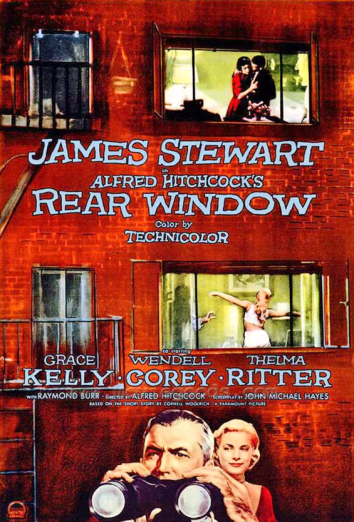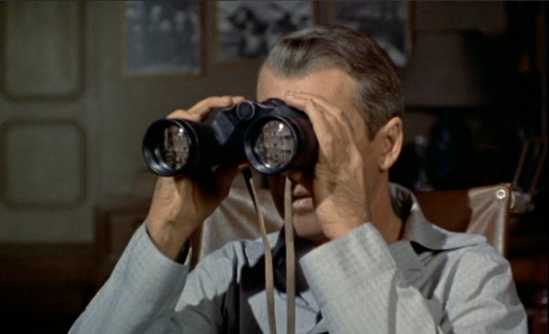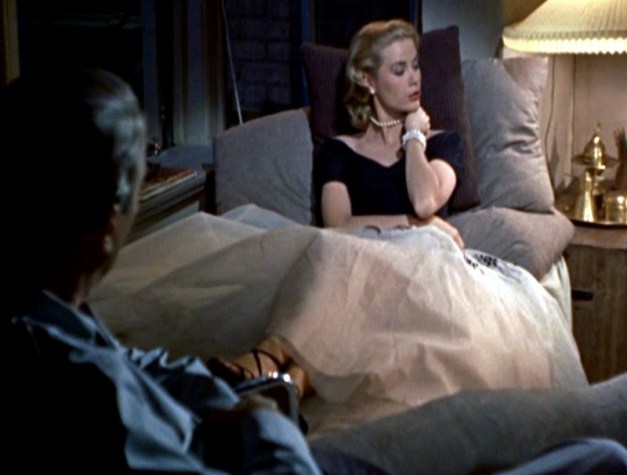What does it mean to be a neighbor?

This question permeated Rear Window, a 1954 Alfred Hitchcock film about photographer L.B. Jeffries, played by James Stewart, is both a modern hero and an incomplete hero, confined to a wheelchair, with nothing to do until his cast is removed except for looking out the rear window of his apartment building, observing the neighbors daily lives. He is worried that his girlfriend, Lisa Freemont, played by Grace Kelly, wouldn’t be a suitable wife, since she is accustomed to a high-society lifestyle she wouldn’t be able to maintain if she traveled with him for work. When Jeffries thinks a crime took place in a neighbor’s apartment, he tries to bring justice to the situation with his binoculars, photography equipment, and the help of whoever will listen. Rated PG, the film is suspenseful but not violent; it would be appropriate for pre-teens and up, but may be disturbing for younger viewers.
*spoiler alert*
The inciting incident in the film is when Jeffries is observing his neighbors, and sees Thornwall, a salesman who often quarreled with his bedridden, sick wife, leave and return to his apartment several times with his sample case at 3 A.M. When his wife is not in the apartment the next day, Jeffries believes that Thornwall murdered her.
*end spoiler alert*
This “monster-in-the-house” thriller finds Jeffries and Lisa thrusting themselves into inner turmoil and danger as they attempt to bring the crime they believe to have been committed to light; they are scared that their neighbor will figure out they are watching him, their search for answers will be ruined, or both. The film is primarily plot-driven, although the characters still play a large role in driving the story. The climax of the film is when Lisa becomes more invested in the mystery, as does Stella, played by Thelma Ritter, a woman who is helping care for Jeffries while he recovers; consequently, they put themselves in harm’s way to find incriminating evidence against the neighbor.
The voyeuristic storyline, which leads the audience to peer into the lives of the neighbors with Jeffries, is intriguing. The characters in each surrounding apartment were interesting, and they developed throughout the film. Unfortunately, after the climax, the film slowed down immensely. The resolution and denouement were mediocre because they felt rushed. There was so much build-up to get to the resolution that it fell flat. The story question of whether or not the criminal would be caught was resolved, but the resolution seemed like a last-minute idea– like it was slapped on just to end the movie.

Part of what made the film interesting was the questions it made me ask. There were times when Jeffries and his girlfriend were so consumed by the crime that they wanted to prove that they seemed completely uninterested in other important things going on in their neighbor’s lives.
*spoiler alert*
Some of these things include seeing a neighbor nearly kill herself with a handful of pills and abusive behavior within apartments.
*end spoiler alert*
The movie made me ask what it meant to be a neighbor as well as when one should be a neighbor and at what cost, and whether or not a person should pick and choose when he acts like a neighbor.
Jeffries and Lisa faced conflict against another character that they barely spoke to. The conflict between Jeffries and Lisa in their romantic relationship was fascinating because they cared for each other deeply, but were still facing challenges. These conflicts cause the characters to both develop into round characters.
The acting was decent in the film all the way around, but Grace Kelly, in particular, stood out. Her witty remarks in the film seemed entirely natural, and when she felt pain as a character, it seemed genuine. While all of the acting seemed good, Grace Kelly’s character seemed most authentic and dynamic.

The film seemed real. I could see myself in each of the main characters, and a little of people I know in each character. I could even see myself in some of the characters– the neighbors– that you don’t even hear speak. I appreciated that the story focused on characters behind closed doors, but with open windows. Never once did the cameras venture out of the apartments and courtyard and into workplaces or public settings. The egregious slowness during part of the film and the so-so resolution and denouement affected how I viewed it overall, but the relatability and the humanity in the film set it apart from mediocre, run-of-the-mill thrillers. B+.
Jenna Shackelford
9/20/17
